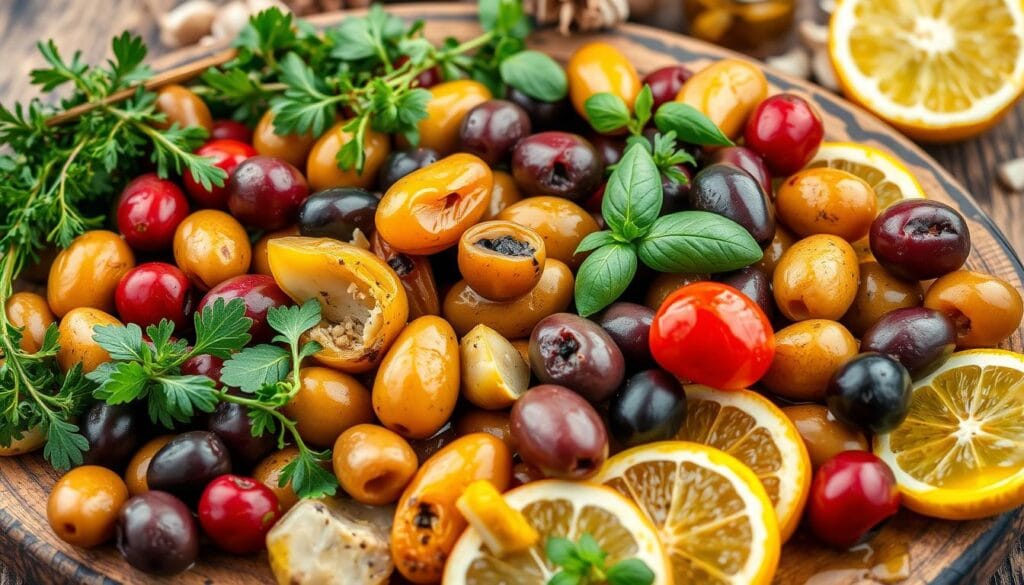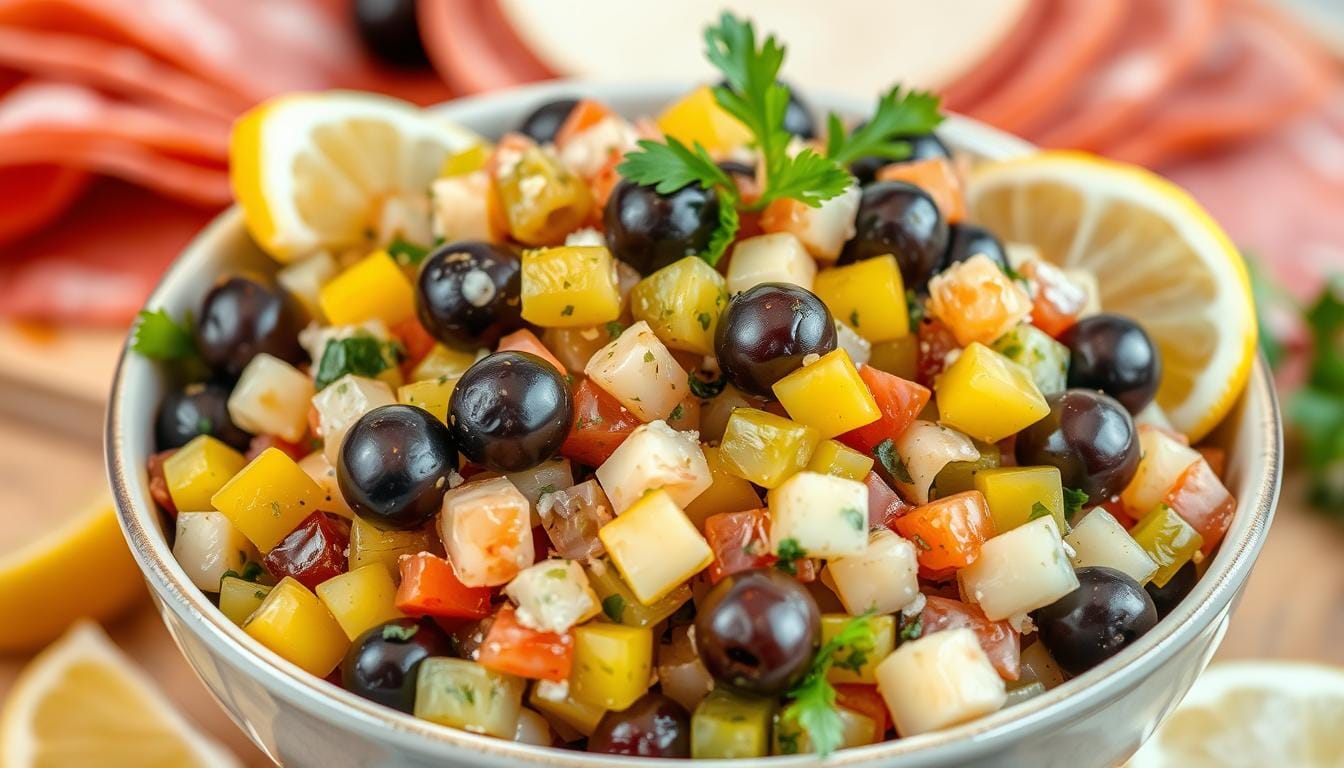The smell of a fresh muffaletta sandwich is amazing. It has savory meats, melted cheese, and tangy olive salad. It feels like a trip to New Orleans’ lively streets. But why purchase it when you can make it at home? Let’s learn how to make the perfect muffaletta olive salad.
This salad is more than just a topping. It makes your dishes taste like they’re from Louisiana. It’s a journey of flavors that you can enjoy at home.
Key Takeaways
- Muffaletta olive salad is a staple ingredient in the famous New Orleans sandwich
- The salad combines a medley of green and kalamata olives, giardiniera, pepperoncini, capers, and aromatic herbs and spices
- This recipe is inspired by the original version from Central Grocery, the birthplace of the muffaletta sandwich
- The salad can be easily prepared at home using a food processor or by hand chopping the ingredients
- The versatile olive salad can be used in sandwiches, as a spread, or as a topping for crackers and crostini
Table of Contents
Understanding the New Orleans Muffaletta Heritage
The muffaletta sandwich is a key part of New Orleans’ food scene. It started at Central Grocery in the French Quarter. This sandwich mixes Italian and Creole tastes, showing the city’s diverse food culture.
Origins at Central Grocery
Central Grocery opened in 1906. It was founded by Salvatore Lupo and Gaetano DeMajo, Italian immigrants. The 900 block of Decatur Street, where it’s located, was once full of Sicilian-owned shops. These places helped shape the muffaletta’s Mediterranean flavors.
Cultural Significance in Louisiana Cuisine
Between 1884 and 1924, almost 300,000 Sicilian immigrants came to New Orleans. Many settled in the French Quarter, creating an “Italian Colony.” This brought Italian food traditions to the area, making the muffaletta a key part of Louisiana cuisine.
Traditional Recipe Evolution
The muffaletta recipe has changed over time. Places like Montalbano’s and Canal Villere have their own versions. Today, Cochon Butcher and Napoleon House also offer their takes. This shows how the muffaletta remains a favorite Louisiana specialty.
Essential Ingredients for Authentic Muffaletta Olive Salad
Making an authentic muffaletta olive salad is key to the iconic New Orleans sandwich. It needs a mix of olives, brined veggies, and herbs for its unique taste. Let’s look at the main parts:
- Pimento-Stuffed Green Olives – They add a salty-sweet taste and bright color.
- Kalamata Olives – They bring a rich, fruity flavor that goes well with the green olives.
- Giardiniera – These Italian pickled veggies, like cauliflower and peppers, add crunch and zest.
- Pepperoncini – They add a gentle heat and tanginess.
- Capers – They add a salty, sharp taste.
- Garlic – It gives a strong aroma that holds all the flavors together.
- Oregano – This herb adds earthy, savory flavors.
- Olive Oil – It holds everything together and makes a tasty dressing.
You can also add roasted red peppers, pickled onions, and fresh parsley. These extra ingredients make the salad more complex and balanced. The mix of brined and pickled veggies is crucial for the real taste of a muffaletta sandwich.
Choosing the Right Olives and Vegetables
When making a marinated olive medley for your sandwich topping, picking the right olives and veggies is key. Start with green olives stuffed with pimento and kalamata olives for a solid base.
Green and Kalamata Olive Selection
Choose high-quality, salty green olives and tasty kalamata olives. This mix will make your marinated olive medley full of mediterranean flavors. It balances textures and tastes perfectly.
Giardiniera and Pepperoncini Guide
Giardiniera is a tangy Italian pickle mix with cauliflower, onions, carrots, and celery. It adds a crunchy, zesty touch to your sandwich topping. Pepperoncini, with their mild, sweet tang, pair well with the briny olives.
Fresh vs. Pickled Vegetable Options
- For a lively marinated olive medley, mix fresh and pickled veggies. Add roasted red peppers, pickled cocktail onions, and crisp celery and carrots. They bring flavor and texture to your mediterranean flavors salad.
- Combining pickled and fresh veggies balances the salad. Pickled ones add a tangy kick, while fresh ones offer a refreshing crunch.
By picking the right olives and veggies, you’ll make a great sandwich topping for your Muffaletta sandwich. It will be full of mediterranean flavors and delicious texture.
Required Tools and Equipment
Making a real muffaletta olive salad at home needs some key kitchen tools. A food processor or mini chopper can chop veggies fast. But, you can also chop by hand for a more traditional feel. You’ll need a big mixing bowl, measuring cups and spoons, and a sharp knife for chopping.
For keeping the salad fresh, you’ll need airtight containers. If you want to can it, you’ll need canning jars, lids, and a big pot for water bath processing.
| Essential Tools | Recommended Size/Quantity |
|---|---|
| Food Processor or Mini Chopper | 7-9 cup capacity |
| Large Mixing Bowl | 4-6 quarts |
| Measuring Cups and Spoons | 1 cup, 1/2 cup, 1/4 cup, 1 tablespoon, 1 teaspoon |
| Sharp Chef’s Knife | 8-10 inches |
| Airtight Storage Containers | 2-3 quart capacity |
| Canning Jars, Lids, and Large Pot | For water bath canning |
With the right kitchen tools and chopping techniques, you’ll make a perfect homemade muffaletta olive salad.

Step-by-Step Muffaletta Olive Salad Preparation
Making the perfect homemade olive salad is a fun journey. It’s the heart of a classic New Orleans-style muffaletta sandwich. This spread adds bold Italian flavors and a lively texture to any sandwich or appetizer. Let’s explore how to make the ultimate homemade olive salad.
Proper Chopping Techniques
Start by chopping or pulsing olives and veggies in a food processor. You want a coarse texture, not a smooth one. Try for pieces about 1/4 to 1/2 inch big. This lets each flavor stand out.
Mixing and Seasoning Process
In a big bowl, mix chopped olives, sun-dried tomatoes, roasted red peppers, guindilla chillies, and capers. Add extra virgin olive oil, minced garlic, dried oregano, fresh basil, and parsley. Finish with red wine vinegar and stir well to mix flavors evenly.
Achieving the Perfect Texture
The salad’s texture is key. It should be chunky, with each piece keeping its own taste. After mixing, chill it in the fridge for at least 24 hours. This lets the flavors blend and the texture perfect.
Follow these steps to make a homemade olive salad that’s just like the New Orleans muffaletta. Use it as a sandwich spread or a tasty Italian dip. Enjoy!
Seasoning and Oil Combinations
Creating the perfect Mediterranean flavors for the muffaletta olive salad is all about the seasonings and oils. You’ll need a mix of dried Italian herbs like oregano and basil. Add a bit of black pepper and celery seed for extra depth. Fresh parsley brings a vibrant, herbal flavor.
The oil mix is key. Use extra virgin olive oil for its strong, peppery taste. Pair it with a neutral oil, like canola, for balance. This blend brings together mediterranean flavors and olive oil in harmony.
A splash of red wine vinegar can also enhance the salad. It cuts through the richness of the olives and oil. This makes the flavors more balanced and delicious.
Remember, taste and adjust as you go. The salad will get better with time as the flavors meld together.
| Ingredient | Quantity |
|---|---|
| Dried Oregano | 1 tsp |
| Dried Basil | 1 tsp |
| Black Pepper | 1/2 tsp |
| Celery Seed | 1/4 tsp |
| Fresh Parsley, chopped | 2 tbsp |
| Extra Virgin Olive Oil | 1/4 cup |
| Canola Oil | 2 tbsp |
| Red Wine Vinegar | 1 tbsp |

Choosing the right mediterranean flavors, italian herbs, and olive oil blend is crucial. It makes your muffaletta olive salad a true taste of New Orleans.
Storage and Marination Tips
Keeping your muffaletta olive salad fresh is key. It ensures the flavors stay bold and the textures vibrant. Follow these simple tips to enjoy this New Orleans favorite for weeks.
Optimal Refrigeration Methods
Keep your salad in an airtight container in the fridge to maintain the flavor and prevent spoilage. Enjoy it for up to two weeks this way.
Long-term Preservation Techniques
- Freeze the salad for up to three months. Use an airtight, freezer-safe container or bag.
- For even longer storage, use water bath canning. Process jars for 10 minutes and ensure a tight seal.
Shelf Life Guidelines
The salad’s flavors will get better with time. Allow it to marinate in the fridge for at least 30 minutes before serving. This makes the flavors richer and more cohesive.
To keep the salad’s color bright, always cover it with olive oil. This easy step can extend its shelf life by several days.
| Storage Method | Shelf Life |
|---|---|
| Refrigerated | Up to 2 weeks |
| Frozen | Up to 3 months |
| Canned | Up to 1 year |
By using these storage and marination tips, you can enjoy the authentic flavors of muffaletta olive salad for a long time. With a bit of planning, this New Orleans classic can become a regular in your kitchen.
Creative Ways to Use Muffaletta Olive Salad
The muffaletta olive salad is a versatile condiment that can make many Mediterranean dishes better. It’s not just for the classic muffaletta sandwich. This flavorful mix can add excitement to your meals in many ways.
Try it as an antipasto with crackers or crostini for a fancy appetizer. Add it to pasta salads for a Mediterranean twist. Or, top green salads with it for more flavor and texture. Blend it with mayonnaise for a creamy spread or dip.
Be bold and use it as a mediterranean appetizer topping on homemade pizza or flatbread. Its salty, tangy taste goes great with melted cheese and other pizza toppings. The uses for this versatile condiment are endless.

Whether you’re having a party or just want to spice up your meals, the muffaletta olive salad is perfect. Try it in different dishes and find new ways to enjoy its bold taste.
Troubleshooting Common Preparation Issues
Making the perfect muffaletta olive salad at home is a fun journey. But, it can have its challenges. Don’t worry, with a few easy tips, you can fix common problems and make a great salad.
One big issue is over-processing, making the salad mushy. To avoid this, chop the veggies by hand instead of using a food processor. This keeps the texture right and lets each flavor stand out.
Another problem is flavor balancing. If your salad tastes off, tweak the spices and herbs slowly. Start with small amounts and let the flavors mix before adding more. This careful method helps you get the taste just right.
At times, the salad might get too oily. If this happens, just drain off extra oil or add more chopped veggies. The goal is to keep the right mix of oil and crunchy texture.
If you want a spicier muffaletta olive salad, try adding chopped pickled jalapeños or red pepper flakes. This adds a nice flavor balancing kick without ruining the dish.
Creating the perfect olive salad tips takes patience, detail, and a bit of experimentation. With practice and these tips, you’ll soon be making delicious muffaletta olive salad.
Conclusion
Making your own homemade muffaletta olive salad lets you enjoy New Orleans flavors at home. This Italian-inspired condiment is key for the famous muffaletta sandwich. It also enhances the flavor of many other dishes.
Learning about the muffuletta’s history and picking the right olives and veggies is important. Follow the steps to make a delicious olive salad that brings Louisiana’s food traditions to life. Proper storage and marination keep the salad’s bold taste for weeks.
The muffuletta sandwich is a culinary gem that brings people together. It’s a mix of cured meats, melted cheese, and the signature olive salad. Making it at home lets you enjoy the Mediterranean and Louisiana flavors in every bite.


7 thoughts on “How to Make the Perfect Muffaletta Olive Salad at Home”
Comments are closed.